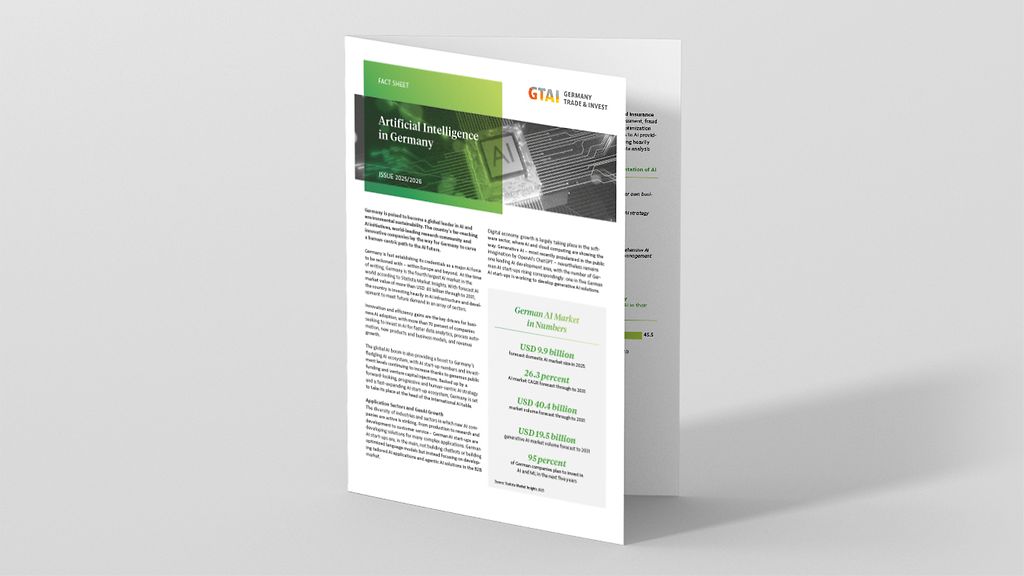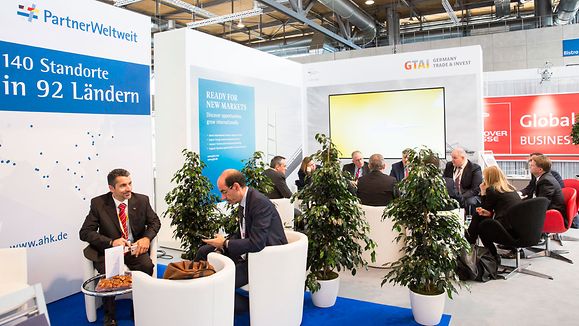Quelle: projections made by Statista 04/2025, KPMG
Your company is already operating in Germany and you would now like to export worldwide?
Key Facts
Fast-growing AI Market
Germany’s AI market is growing fast. The country’s digital economy is addressing the challenges of global economic and geopolitical uncertainty head on. Turnover is up, particularly in the software sector, and the AI and cloud computing segments are enjoying record growth. Germany is a global pioneer when it comes to using AI in industrial manufacturing. The current trend for generative AI is also seeing a shift to applications and agentic AI.
Facts & Figures
Strong Digital Economy and Growing AI Market
The AI market in Germany is forecast at more than EUR 9 billion in 2025 and is forecast to grow to EUR 37 billion in 2031 – equivalent to an annual growth rate of more than 26 percent. This enormous growth potential makes AI one of the country’s most important future markets. More than 70 percent of companies in Germany are seeking to invest in AI for faster data analytics, process automation, new products and business models.
Diverse AI Application Markets
Artificial intelligence is a cross-sectional technology that can be deployed in any number of scenarios. Within Germany, significant AI market potential exists in automation and additive manufacturing where AI will shape the next generation of automation technologies. Significant developments are also expected in the healthcare, mobility and energy sectors.
Top 5 Business Sectors by AI Use in Germany
As percent of AI-using companies that deploy AI in their respective sector.
Investing in AI Infrastructure and Innovation
Germany is a leading international location for AI development and implementation. The country was one of the first in the world to develop a national AI strategy. The country’s new High-Tech Agenda 2025 puts AI at the center of technology innovation activities. Rising demand for AI and cloud services is fueling nationwide data center infrastructure expansion, with data centers equipped with GPU clusters and high-density computing also becoming increasingly important to the developing market.
Opportunities
Innovation Excellence and Industry Strength
Germany boasts an unparalleled tradition of research excellence and industry leadership.
Innovation and Efficiency Increases
Innovation and efficiency increases are drivers for business AI adoption. More than 70 percent of businesses in Germany are planning to invest in AI in 2025 for the following reasons:
- quicker data analysis
- process automation
- new products and business models
- Increased turnover
Targeted AI Ecosystem Measures
- Political Support: Creation of more affordable energy for data centers
- High-Tech Strategy: Strong focus on AI and chip manufacturing, with an emphasis on industrial applications
- Development of European Cloud Infrastructure (GAIA-X): Offers common standards for data exchange
- Application for Giga Factories (1–3) in Germany: EU program to construct high-capacity processing centers (to train AI models) in the European Union to be operational by 2027.The government aims to coordinate its applications with industry, experts, and federal states by the end of the year.
Two AI Factories currently active in Germany:
- HammerHAI in Stuttgart
- JUPITER AI Factory (JAIF) in Jülich, the fastest Supercomputer in Europe and first exascale computer
- IPCEI AI in Preparation: Project for industry-specific within the EU, jointly implemented by several European partners
Germany offers significant AI market opportunities in a variety of industry sectors.
Industry & Manufacturing
- Automation of production processes, predictive maintenance and quality control (particularly relevant for German mechanical engineering and automotive industries)
- Robotics is currently a highly promising area of application in manufacturing and logistics
- Significant efficiency gains and cost reductions through AI-driven systems
Healthcare
- Applications in diagnostics, image processing, drug development, and patient management
- Major opportunities for start-ups and established companies in the healthtech sector
Finance & Insurance
- AI used for risk assessment, fraud detection, automated consulting, and process optimization
- Banks and insurance companies investing heavily in generative AI for customer interaction and data analysis
Business Environment
AI Made in Germany – Clusters, Networks and Innovation
Germany’s government has placed AI front and center of its High-Tech Agenda 2025. Internationally renowned research institutions, business and innovation hubs and a flourishing AI ecosystem provide the tools and services for successful AI business operations in Germany.
High-Tech Agenda 2025
Artificial intelligence has been identified as one of six key technologies – alongside semiconductor research and production – within the federal government’s High-Tech Agenda 2025. The stated objective is to generate 10 percent of domestic economic output from AI-based activities by 2030.
The EUR 5.5 billion policy initiative to promote “new technologies made in Germany” will set aside large-scale funding for next-generation intelligence models, increased computing capacity and data infrastructure with a focus on industrial applications.
Flagship knowledge transfer projects for AI application in key industries – automotive, chemicals, biotechnology, cleantech, medicine, and agrifood – and central research areas (materials, climate, biodiversity, energy, and sustainability and research) will be set up from 2026 onward.
Implementation will begin in autumn 2025 with coordinated efforts between researchers, industry, start-ups, and policymakers to accelerate commercialization of new technologies. The agenda envisions AI systems deployed at scale — in industry, at home, and in health care — with a focus on reliability, transparency, and integration into existing sectors. Investment in AI infrastructure will also support quantum research, as large-scale simulations and hybrid quantum-classical algorithms will require massive computational resources.
AI Start-ups and Scale-ups
Germany’s AI start-up landscape boasted 687 start-ups in 2024 – equivalent to year-on-year growth of 35 percent. Berlin and Munich dominate the AI start-up landscape, accounting for around 50 percent of all AI start-ups in the country.
AI Industry and Enterprise Functions
The AI dominance in cross-industry is strongly observable in Germany. However, of those AI start-ups and scale-ups with a defined industry focus, healthcare and social services, manufacturing, and transport, mobility and storage are the most visible sectors. There is a notable increase in AI start-ups in cross-industry applications and manufacturing and production.
The Applied AI Institute for Europe reports that, within those AI start-ups and scale-ups with an observable industrial focus, the predominant areas of use are in cross-industry, healthcare and social services, manufacturing, and transport, mobility and storage. The noted year-on-year tendency is toward cross-industry applications and use within the manufacturing and production sector.
This shift toward broader areas of application for AI technology indicates a maturity in AI solutions, with cross-industry solutions increasingly capable of addressing complex, real-world problems across different sectors. Almost all AI start-ups surveyed were identified as being B2B start-up operations.
VC Funding Attractivity
AI start-ups are proving particularly attractive for venture capital funding. Berlin and Munich raised the most funding for agentic AI in the country and belong to the world’s top 11 VC destinations occupying third and 11th spots respectively.
“Trusted AI“ in Europe
Germany’s adoption of an ethical, trustworthy and transparent AI policy provides a real competitive edge and location advantage in a number of industries and application areas. The introduction of AI legislation and data privacy laws in Europe and Germany have advanced the growth of ethical and human-centric AI practices, helping make Germany a global leader in “trusted AI” implementation. The use of AI in Germany is subject to several specific framework conditions that encompass legal, ethical, and infrastructural factors designed to promote a “human-centric” AI policy that creates trust and security.
The ArtificiaI Intelligence Act Europe
The AI Act pursues a risk-based approach that aims to categorize AI applications according to their risk potential and shows concrete effects in interaction with the General Data Protection Regulation (GDPR). According to Bitkom Research, 73 percent of companies in Germany believe that clear AI regulations can offer a competitive advantage for European companies if implemented correctly.
Downloads
Looking for detailed reports on industry segments and opportunities? Download our free Industry Overview for more data, analysis and insights.




